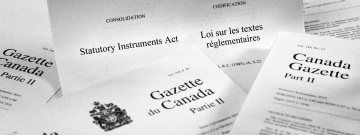Chapter 17 Delegated Legislation

The central problem relating to legislative review of executive and administrative law-making is the degree to which Parliament should involve itself in attempting to influence and control the course of administration. If Parliament goes too far into the substance of day-to-day administration, it defeats many of the underlying reasons for delegating powers to make laws in the first place.
SPECIAL COMMITTEE ON STATUTORY INSTRUMENTS,
Third Report (Journals, October 22, 1969, p. 1482)
Some acts of Parliament delegate to Ministers, departments, agencies, boards or other authorities the power to make and apply subordinate legislation described only in general terms in the acts. Delegated legislation is a term used to describe these regulations, orders, rules, by-laws and other instruments. Parliament scrutinizes most delegated legislation to ensure that their provisions do not exceed the powers approved by Parliament itself.
Most regulations have to meet the requirements of a series of steps known as the regulatory process. This process usually begins with the development of a regulatory proposal by the department responsible for an enabling act, and ends with parliamentary scrutiny of the regulations.1
This responsibility to scrutinize delegated legislation has been assigned to the Standing Joint Committee for the Scrutiny of Regulations. In addition to the terms of reference set out by the House itself, this Committee’s mandate is in part described by an act of Parliament.2 Its activities sometimes lead to the invocation of special procedures in the House when the Committee makes a report to the House advocating the revocation of a regulation.
This chapter discusses the mandate of the Standing Joint Committee for the Scrutiny of Regulations and the procedures the House follows to adopt or reject a resolution that a statutory instrument be revoked.